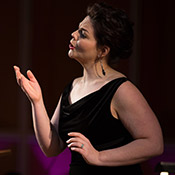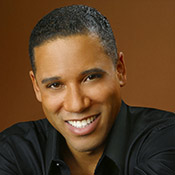
Stories to Tell: Maestro Joseph Rescigno & Tenor Noah Stewart on the Florentine Opera’s The Magic Flute
David Lewellen
PUBLISHED
Tagged Under: 2017.18 Season, Conductor, Guest Artist, opera, Partners, Vocalist
Maestro Joseph Rescigno has had a longer relationship with the Milwaukee Symphony than any other conductor in the group’s history. In fact, he’s had long relationships with many institutions — and singers — and composers. And the stories spill out easily.
Sitting down with Rescigno, the principal conductor of the Florentine Opera, and with Noah Stewart, who sings Tamino in the Florentine’s upcoming production of Mozart’s The Magic Flute, the stories keep coming. His uncle, Nicola Rescigno, was a conductor who helped found Lyric Opera of Chicago and Dallas Opera, and young Joseph helped out as a rehearsal pianist.
“That’s why I was at Beniamino Gigli’s last recital,” Rescigno says, referring to the great Italian tenor who died in 1957.
“No way!” Stewart says, his eyes wide. “He’s one of my favorite singers. I’ve got to take you out later and hear more about that.” Turning, he says, “That’s a perfect example of why this guy’s so amazing.”
The MSO has been the pit orchestra for the Florentine Opera for decades, a somewhat unusual relationship between a city’s biggest orchestra and its biggest opera company. And Rescigno has been in his current post with the Florentine for 37 years. At this point, he says, during rehearsal, “a lot of times I don’t have to say anything, but we understand each other. They know what kind of sound I expect — a certain lightness, so singers don’t get overwhelmed.”
“Mozart writes so beautifully for the voice,” Stewart says. “It’s very collaborative with the orchestra. You have to fit together.”
“Mozart, and Wagner, and Richard Strauss, all require very good breath,” Rescigno observes. “Long phrases.”
“See, I never knew that,” Stewart says. But it makes sense. “In rehearsal, if I can’t finish the phrase, I’ll say, ‘Can we take that faster?’ But he doesn’t.”
Rescigno grins. “Let’s find a tempo that makes sense through the most difficult passage. Slowing down or speeding up to get through a phrase is not a solution.”
In fact, tempos were one reason why he avoided conducting The Magic Flute for decades. The solemn chords that open the overture were usually taken so slowly that he couldn’t figure out how to fit it with the rest of the piece – or with the entire opera. “But they didn’t have metronomes then,” he says. “The tempo markings were not so much to indicate speed as feeling.” In recent years, the trend has been to take that section faster, which makes more sense to Rescigno.
“How important is the overture?” Stewart asks. “Is it like the first scene of a movie?”
“No,” Rescigno says. “In this production, there’s no staging for the overture,” meaning the curtain will be closed and the audience will have nothing to focus on but music. “Sometimes that really helps, and sometimes it distracts.”
But having seven minutes of only music, “I think that prepares you for the opera,” Stewart says. “You’re forced to open up your senses and listen and feel. It’s like the ginger in sushi – it cleanses the palate.”
Stewart is making his role debut as Tamino, and his Mozart opera debut in general, but he has sung lead roles with the Florentine in Carmen and La Boheme in past years. “I do remember that the orchestra is fantastic,” he says.
Unlike most operas, The Magic Flute has a lot of spoken dialogue. “We’ve got a rehearsal this afternoon for just the dialogue,” Stewart said. “There’s a lot of drama in the text. Coming into it at first, I thought it would be light-hearted, but these characters have to go through real challenges. And they learn that it’s OK to be nervous and scared, but there’s joy on the other side of fear.”
This production is also being performed in English, another novel experience for Stewart. “I have to re-learn and re-teach myself what the vowels are,” he says. “It’s almost another language.”
“We’re doing the Andrew Porter translation, which is British English, and sometimes that shows,” Rescigno adds. “But translating a Germanic language into English works better than translating a Romance language,” such as French or Italian.
Singing with an orchestra in the pit is more of a challenge than audiences might think. Most singers do most of their work standing next to a piano, but with a full orchestra far in front of them and below them, “you almost hear nothing,” Stewart explains. “Being on the beat and in tune is quite a challenge.”
And that’s why it’s extra important, he says, to have a conductor he trusts, and a supportive setting like the Florentine. But Rescigno says, “I think you’re going to find that singing Mozart with orchestra is closer to your experience with piano.”
Ninety minutes have gone by, and stories of 50-plus years. Stewart has to go to his next rehearsal. Dress rehearsal this week, performances this weekend – more stories are waiting to happen.



